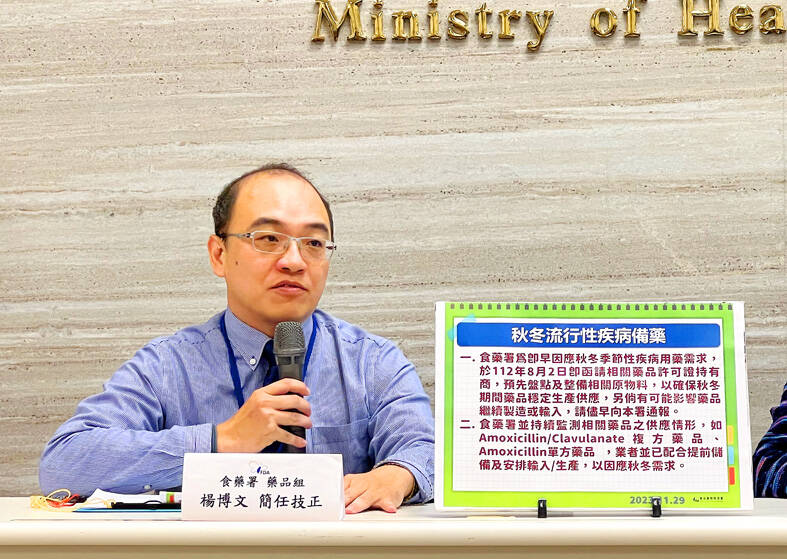Taiwan has enough of the drugs used to treat Mycoplasma pneumoniae, as it increased imports of a brand-name drug last month and expanded domestic production of generic drugs, the Food and Drug Administration (FDA) said yesterday.
As some parts of China are seeing a spike in respiratory illnesses, reportedly caused by multiple pathogens, including the M. pneumoniae bacteria, many Taiwanese media outlets have reported public concerns about children catching M. pneumoniae.
M. pneumoniae is a common bacterial respiratory tract pathogen that causes infections the whole year round in Taiwan, Centers for Disease Control (CDC) Deputy Director-General Philip Lo (羅一鈞) said on Tuesday evening, adding that it mainly spreads from person to person through respiratory droplets.

Photo: CNA
A 2011-2012 survey by the Taiwan Pediatric Infectious Diseases Alliance found that M. pneumoniae was the second-most common pathogen that caused community-acquired pneumonia in children, he said, adding that M. pneumoniae infections are most common in children aged five or older.
The epidemiology of M. pneumoniae has not changed much in 10 years, and most infections are mild, usually resolve on their own and rarely require hospitalization, Lo said.
While historical trends show that M. pneumoniae infections tend to peak every three to seven years, there has not been a significant rise in cases so far this year, he said.
One antibiotic used to treat M. pneumoniae infections in children is azithromycin powder for oral suspension, FDA Deputy Director Cheng Hwei-fang (陳惠芳) said yesterday.
The drug is used to treat bacterial infections of the respiratory tract, skin and soft tissue, as well as otitis media and sexually transmitted diseases, she said, adding that there are two valid drug permits in Taiwan.
An average of 4,680 bottles of azithromycin were used each month last year, but the average monthly usage increased to 8,050 bottles this year, so although 1.3 times more of the drug was imported, supply did not meet demand, she said,
The situation was reported in August, and a large amount of the drug was imported last month, Cheng said, adding that there are about 27,000 bottles in stock, and domestic production of a generic version of the drug has been increased by two to three times.
There are seven valid drug permits in Taiwan for azithromycin oral tablets for adults, and while the average usage is approximately 200,000 tablets per month, there are about 1.3 million tablets in stock — enough to last five to six months — and there are plans to import or manufacture about 2 million tablets next month, so there should be no shortage, she said.
FDA Medicinal Product Division head Yang Bo-wen (楊博文) said in preparation for a likely increase in infections due to Taiwan lifting its COVID-19 restrictions earlier this year and because many respiratory infectious diseases peak in autumn and winter, the FDA on Aug. 2 told drugmakers with permits for antibiotics, drugs for treating respiratory illnesses and gastrointestinal tract infections, antipyretics, and analgesics to ensure a stable supply of the products.

Taiwanese can file complaints with the Tourism Administration to report travel agencies if their activities caused termination of a person’s citizenship, Mainland Affairs Council Minister Chiu Chui-cheng (邱垂正) said yesterday, after a podcaster highlighted a case in which a person’s citizenship was canceled for receiving a single-use Chinese passport to enter Russia. The council is aware of incidents in which people who signed up through Chinese travel agencies for tours of Russia were told they could obtain Russian visas and fast-track border clearance, Chiu told reporters on the sidelines of an event in Taipei. However, the travel agencies actually applied

New measures aimed at making Taiwan more attractive to foreign professionals came into effect this month, the National Development Council said yesterday. Among the changes, international students at Taiwanese universities would be able to work in Taiwan without a work permit in the two years after they graduate, explainer materials provided by the council said. In addition, foreign nationals who graduated from one of the world’s top 200 universities within the past five years can also apply for a two-year open work permit. Previously, those graduates would have needed to apply for a work permit using point-based criteria or have a Taiwanese company

The Shilin District Prosecutors’ Office yesterday indicted two Taiwanese and issued a wanted notice for Pete Liu (劉作虎), founder of Shenzhen-based smartphone manufacturer OnePlus Technology Co (萬普拉斯科技), for allegedly contravening the Act Governing Relations Between the People of the Taiwan Area and the Mainland Area (臺灣地區與大陸地區人民關係條例) by poaching 70 engineers in Taiwan. Liu allegedly traveled to Taiwan at the end of 2014 and met with a Taiwanese man surnamed Lin (林) to discuss establishing a mobile software research and development (R&D) team in Taiwan, prosecutors said. Without approval from the government, Lin, following Liu’s instructions, recruited more than 70 software

Chinese spouse and influencer Guan Guan’s (關關) residency permit has been revoked for repeatedly posting pro-China videos that threaten national security, the National Immigration Agency confirmed today. Guan Guan has said many controversial statements in her videos posted to Douyin (抖音), including “the red flag will soon be painted all over Taiwan” and “Taiwan is an inseparable part of China,” and expressing hope for expedited reunification. The agency last year received multiple reports alleging that Guan Guan had advocated for armed reunification. After verifying the reports, the agency last month issued a notice requiring her to appear and explain her actions. Guan